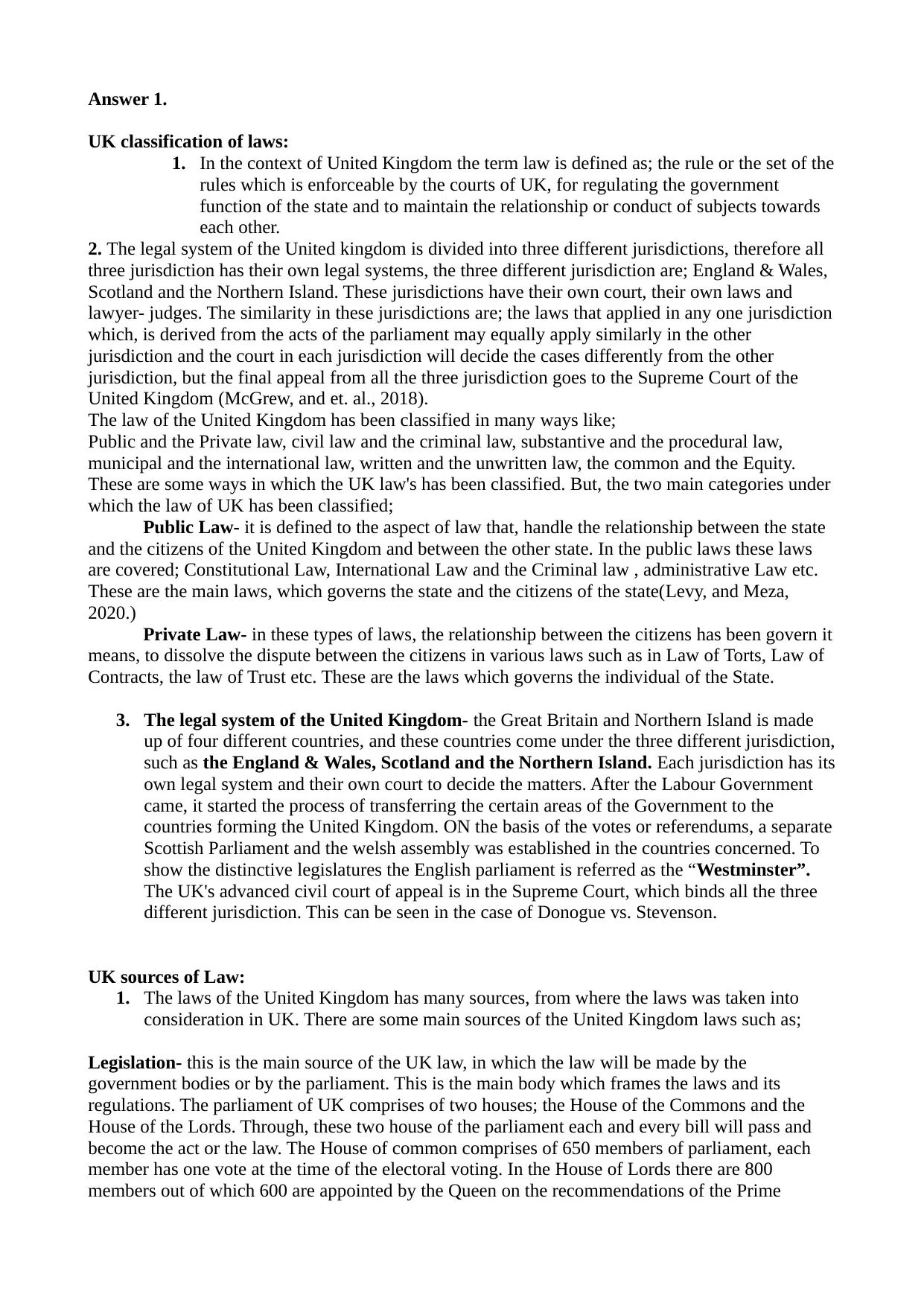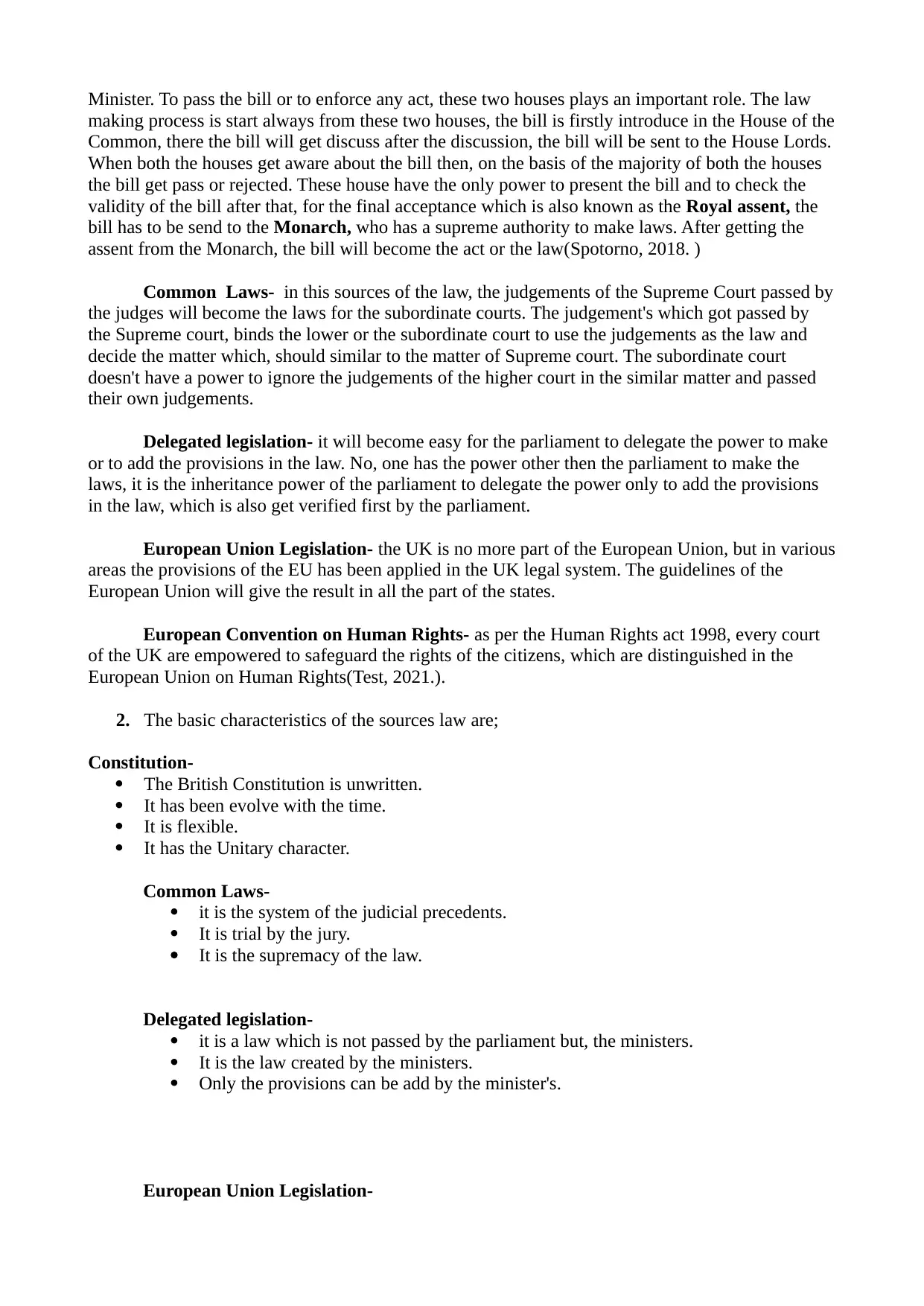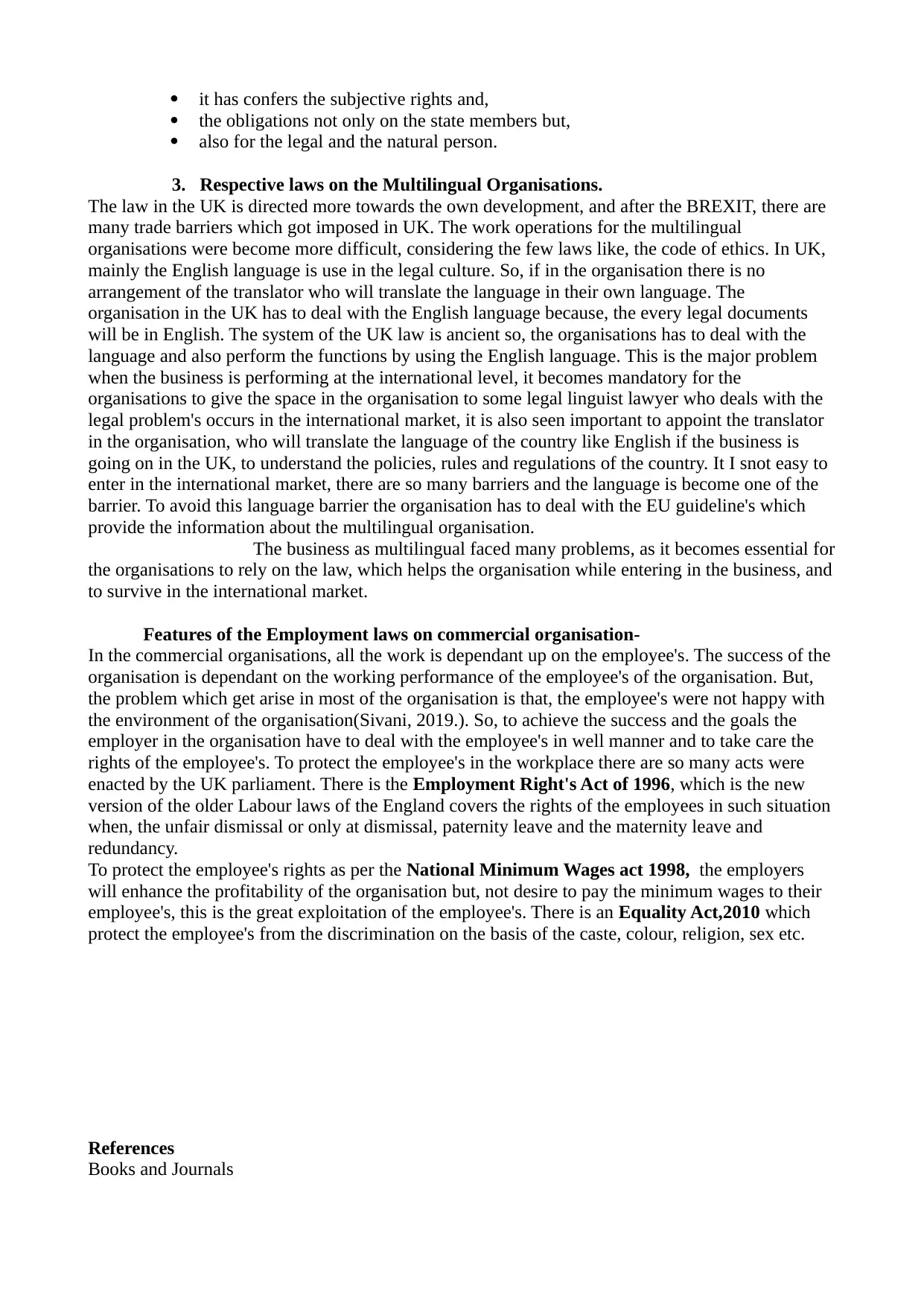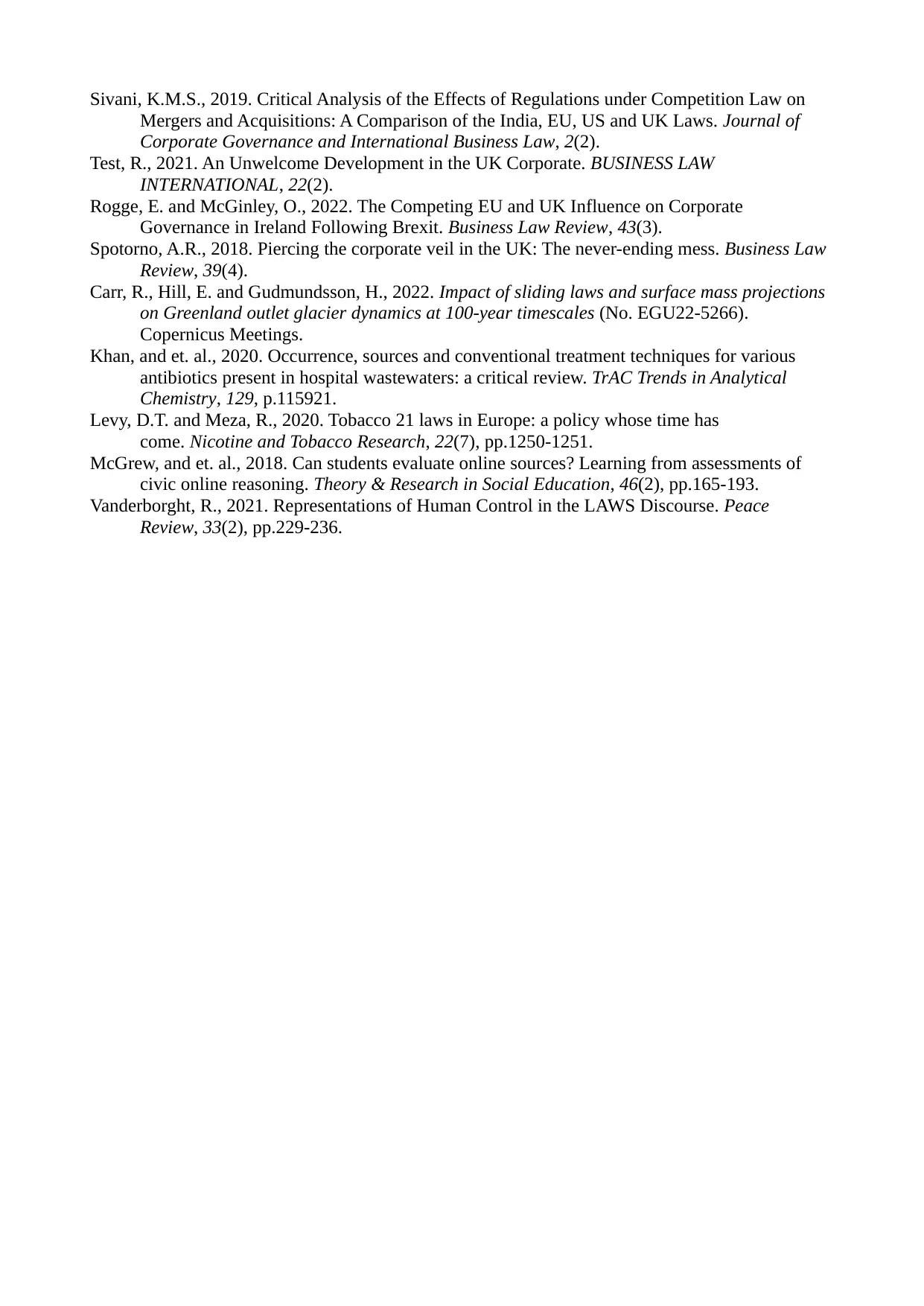UK Classification and Sources of Law: A Comprehensive Overview
VerifiedAdded on 2023/06/09
|5
|2211
|102
AI Summary
This article provides a detailed overview of the classification and sources of law in the UK. It covers the UK legal system, its sources of law, and its impact on multilingual organizations and employment laws. The article also discusses the UK's classification of laws, including public and private law, civil and criminal law, and more. Additionally, it explores the main sources of UK law, such as legislation, common law, delegated legislation, and European Union legislation. The article concludes with a discussion of the challenges faced by multilingual organizations and the features of UK employment laws.
Contribute Materials
Your contribution can guide someone’s learning journey. Share your
documents today.

Business Law
Secure Best Marks with AI Grader
Need help grading? Try our AI Grader for instant feedback on your assignments.

Answer 1.
UK classification of laws:
1. In the context of United Kingdom the term law is defined as; the rule or the set of the
rules which is enforceable by the courts of UK, for regulating the government
function of the state and to maintain the relationship or conduct of subjects towards
each other.
2. The legal system of the United kingdom is divided into three different jurisdictions, therefore all
three jurisdiction has their own legal systems, the three different jurisdiction are; England & Wales,
Scotland and the Northern Island. These jurisdictions have their own court, their own laws and
lawyer- judges. The similarity in these jurisdictions are; the laws that applied in any one jurisdiction
which, is derived from the acts of the parliament may equally apply similarly in the other
jurisdiction and the court in each jurisdiction will decide the cases differently from the other
jurisdiction, but the final appeal from all the three jurisdiction goes to the Supreme Court of the
United Kingdom (McGrew, and et. al., 2018).
The law of the United Kingdom has been classified in many ways like;
Public and the Private law, civil law and the criminal law, substantive and the procedural law,
municipal and the international law, written and the unwritten law, the common and the Equity.
These are some ways in which the UK law's has been classified. But, the two main categories under
which the law of UK has been classified;
Public Law- it is defined to the aspect of law that, handle the relationship between the state
and the citizens of the United Kingdom and between the other state. In the public laws these laws
are covered; Constitutional Law, International Law and the Criminal law , administrative Law etc.
These are the main laws, which governs the state and the citizens of the state(Levy, and Meza,
2020.)
Private Law- in these types of laws, the relationship between the citizens has been govern it
means, to dissolve the dispute between the citizens in various laws such as in Law of Torts, Law of
Contracts, the law of Trust etc. These are the laws which governs the individual of the State.
3. The legal system of the United Kingdom- the Great Britain and Northern Island is made
up of four different countries, and these countries come under the three different jurisdiction,
such as the England & Wales, Scotland and the Northern Island. Each jurisdiction has its
own legal system and their own court to decide the matters. After the Labour Government
came, it started the process of transferring the certain areas of the Government to the
countries forming the United Kingdom. ON the basis of the votes or referendums, a separate
Scottish Parliament and the welsh assembly was established in the countries concerned. To
show the distinctive legislatures the English parliament is referred as the “Westminster”.
The UK's advanced civil court of appeal is in the Supreme Court, which binds all the three
different jurisdiction. This can be seen in the case of Donogue vs. Stevenson.
UK sources of Law:
1. The laws of the United Kingdom has many sources, from where the laws was taken into
consideration in UK. There are some main sources of the United Kingdom laws such as;
Legislation- this is the main source of the UK law, in which the law will be made by the
government bodies or by the parliament. This is the main body which frames the laws and its
regulations. The parliament of UK comprises of two houses; the House of the Commons and the
House of the Lords. Through, these two house of the parliament each and every bill will pass and
become the act or the law. The House of common comprises of 650 members of parliament, each
member has one vote at the time of the electoral voting. In the House of Lords there are 800
members out of which 600 are appointed by the Queen on the recommendations of the Prime
UK classification of laws:
1. In the context of United Kingdom the term law is defined as; the rule or the set of the
rules which is enforceable by the courts of UK, for regulating the government
function of the state and to maintain the relationship or conduct of subjects towards
each other.
2. The legal system of the United kingdom is divided into three different jurisdictions, therefore all
three jurisdiction has their own legal systems, the three different jurisdiction are; England & Wales,
Scotland and the Northern Island. These jurisdictions have their own court, their own laws and
lawyer- judges. The similarity in these jurisdictions are; the laws that applied in any one jurisdiction
which, is derived from the acts of the parliament may equally apply similarly in the other
jurisdiction and the court in each jurisdiction will decide the cases differently from the other
jurisdiction, but the final appeal from all the three jurisdiction goes to the Supreme Court of the
United Kingdom (McGrew, and et. al., 2018).
The law of the United Kingdom has been classified in many ways like;
Public and the Private law, civil law and the criminal law, substantive and the procedural law,
municipal and the international law, written and the unwritten law, the common and the Equity.
These are some ways in which the UK law's has been classified. But, the two main categories under
which the law of UK has been classified;
Public Law- it is defined to the aspect of law that, handle the relationship between the state
and the citizens of the United Kingdom and between the other state. In the public laws these laws
are covered; Constitutional Law, International Law and the Criminal law , administrative Law etc.
These are the main laws, which governs the state and the citizens of the state(Levy, and Meza,
2020.)
Private Law- in these types of laws, the relationship between the citizens has been govern it
means, to dissolve the dispute between the citizens in various laws such as in Law of Torts, Law of
Contracts, the law of Trust etc. These are the laws which governs the individual of the State.
3. The legal system of the United Kingdom- the Great Britain and Northern Island is made
up of four different countries, and these countries come under the three different jurisdiction,
such as the England & Wales, Scotland and the Northern Island. Each jurisdiction has its
own legal system and their own court to decide the matters. After the Labour Government
came, it started the process of transferring the certain areas of the Government to the
countries forming the United Kingdom. ON the basis of the votes or referendums, a separate
Scottish Parliament and the welsh assembly was established in the countries concerned. To
show the distinctive legislatures the English parliament is referred as the “Westminster”.
The UK's advanced civil court of appeal is in the Supreme Court, which binds all the three
different jurisdiction. This can be seen in the case of Donogue vs. Stevenson.
UK sources of Law:
1. The laws of the United Kingdom has many sources, from where the laws was taken into
consideration in UK. There are some main sources of the United Kingdom laws such as;
Legislation- this is the main source of the UK law, in which the law will be made by the
government bodies or by the parliament. This is the main body which frames the laws and its
regulations. The parliament of UK comprises of two houses; the House of the Commons and the
House of the Lords. Through, these two house of the parliament each and every bill will pass and
become the act or the law. The House of common comprises of 650 members of parliament, each
member has one vote at the time of the electoral voting. In the House of Lords there are 800
members out of which 600 are appointed by the Queen on the recommendations of the Prime

Minister. To pass the bill or to enforce any act, these two houses plays an important role. The law
making process is start always from these two houses, the bill is firstly introduce in the House of the
Common, there the bill will get discuss after the discussion, the bill will be sent to the House Lords.
When both the houses get aware about the bill then, on the basis of the majority of both the houses
the bill get pass or rejected. These house have the only power to present the bill and to check the
validity of the bill after that, for the final acceptance which is also known as the Royal assent, the
bill has to be send to the Monarch, who has a supreme authority to make laws. After getting the
assent from the Monarch, the bill will become the act or the law(Spotorno, 2018. )
Common Laws- in this sources of the law, the judgements of the Supreme Court passed by
the judges will become the laws for the subordinate courts. The judgement's which got passed by
the Supreme court, binds the lower or the subordinate court to use the judgements as the law and
decide the matter which, should similar to the matter of Supreme court. The subordinate court
doesn't have a power to ignore the judgements of the higher court in the similar matter and passed
their own judgements.
Delegated legislation- it will become easy for the parliament to delegate the power to make
or to add the provisions in the law. No, one has the power other then the parliament to make the
laws, it is the inheritance power of the parliament to delegate the power only to add the provisions
in the law, which is also get verified first by the parliament.
European Union Legislation- the UK is no more part of the European Union, but in various
areas the provisions of the EU has been applied in the UK legal system. The guidelines of the
European Union will give the result in all the part of the states.
European Convention on Human Rights- as per the Human Rights act 1998, every court
of the UK are empowered to safeguard the rights of the citizens, which are distinguished in the
European Union on Human Rights(Test, 2021.).
2. The basic characteristics of the sources law are;
Constitution-
The British Constitution is unwritten.
It has been evolve with the time.
It is flexible.
It has the Unitary character.
Common Laws-
it is the system of the judicial precedents.
It is trial by the jury.
It is the supremacy of the law.
Delegated legislation-
it is a law which is not passed by the parliament but, the ministers.
It is the law created by the ministers.
Only the provisions can be add by the minister's.
European Union Legislation-
making process is start always from these two houses, the bill is firstly introduce in the House of the
Common, there the bill will get discuss after the discussion, the bill will be sent to the House Lords.
When both the houses get aware about the bill then, on the basis of the majority of both the houses
the bill get pass or rejected. These house have the only power to present the bill and to check the
validity of the bill after that, for the final acceptance which is also known as the Royal assent, the
bill has to be send to the Monarch, who has a supreme authority to make laws. After getting the
assent from the Monarch, the bill will become the act or the law(Spotorno, 2018. )
Common Laws- in this sources of the law, the judgements of the Supreme Court passed by
the judges will become the laws for the subordinate courts. The judgement's which got passed by
the Supreme court, binds the lower or the subordinate court to use the judgements as the law and
decide the matter which, should similar to the matter of Supreme court. The subordinate court
doesn't have a power to ignore the judgements of the higher court in the similar matter and passed
their own judgements.
Delegated legislation- it will become easy for the parliament to delegate the power to make
or to add the provisions in the law. No, one has the power other then the parliament to make the
laws, it is the inheritance power of the parliament to delegate the power only to add the provisions
in the law, which is also get verified first by the parliament.
European Union Legislation- the UK is no more part of the European Union, but in various
areas the provisions of the EU has been applied in the UK legal system. The guidelines of the
European Union will give the result in all the part of the states.
European Convention on Human Rights- as per the Human Rights act 1998, every court
of the UK are empowered to safeguard the rights of the citizens, which are distinguished in the
European Union on Human Rights(Test, 2021.).
2. The basic characteristics of the sources law are;
Constitution-
The British Constitution is unwritten.
It has been evolve with the time.
It is flexible.
It has the Unitary character.
Common Laws-
it is the system of the judicial precedents.
It is trial by the jury.
It is the supremacy of the law.
Delegated legislation-
it is a law which is not passed by the parliament but, the ministers.
It is the law created by the ministers.
Only the provisions can be add by the minister's.
European Union Legislation-

it has confers the subjective rights and,
the obligations not only on the state members but,
also for the legal and the natural person.
3. Respective laws on the Multilingual Organisations.
The law in the UK is directed more towards the own development, and after the BREXIT, there are
many trade barriers which got imposed in UK. The work operations for the multilingual
organisations were become more difficult, considering the few laws like, the code of ethics. In UK,
mainly the English language is use in the legal culture. So, if in the organisation there is no
arrangement of the translator who will translate the language in their own language. The
organisation in the UK has to deal with the English language because, the every legal documents
will be in English. The system of the UK law is ancient so, the organisations has to deal with the
language and also perform the functions by using the English language. This is the major problem
when the business is performing at the international level, it becomes mandatory for the
organisations to give the space in the organisation to some legal linguist lawyer who deals with the
legal problem's occurs in the international market, it is also seen important to appoint the translator
in the organisation, who will translate the language of the country like English if the business is
going on in the UK, to understand the policies, rules and regulations of the country. It I snot easy to
enter in the international market, there are so many barriers and the language is become one of the
barrier. To avoid this language barrier the organisation has to deal with the EU guideline's which
provide the information about the multilingual organisation.
The business as multilingual faced many problems, as it becomes essential for
the organisations to rely on the law, which helps the organisation while entering in the business, and
to survive in the international market.
Features of the Employment laws on commercial organisation-
In the commercial organisations, all the work is dependant up on the employee's. The success of the
organisation is dependant on the working performance of the employee's of the organisation. But,
the problem which get arise in most of the organisation is that, the employee's were not happy with
the environment of the organisation(Sivani, 2019.). So, to achieve the success and the goals the
employer in the organisation have to deal with the employee's in well manner and to take care the
rights of the employee's. To protect the employee's in the workplace there are so many acts were
enacted by the UK parliament. There is the Employment Right's Act of 1996, which is the new
version of the older Labour laws of the England covers the rights of the employees in such situation
when, the unfair dismissal or only at dismissal, paternity leave and the maternity leave and
redundancy.
To protect the employee's rights as per the National Minimum Wages act 1998, the employers
will enhance the profitability of the organisation but, not desire to pay the minimum wages to their
employee's, this is the great exploitation of the employee's. There is an Equality Act,2010 which
protect the employee's from the discrimination on the basis of the caste, colour, religion, sex etc.
References
Books and Journals
the obligations not only on the state members but,
also for the legal and the natural person.
3. Respective laws on the Multilingual Organisations.
The law in the UK is directed more towards the own development, and after the BREXIT, there are
many trade barriers which got imposed in UK. The work operations for the multilingual
organisations were become more difficult, considering the few laws like, the code of ethics. In UK,
mainly the English language is use in the legal culture. So, if in the organisation there is no
arrangement of the translator who will translate the language in their own language. The
organisation in the UK has to deal with the English language because, the every legal documents
will be in English. The system of the UK law is ancient so, the organisations has to deal with the
language and also perform the functions by using the English language. This is the major problem
when the business is performing at the international level, it becomes mandatory for the
organisations to give the space in the organisation to some legal linguist lawyer who deals with the
legal problem's occurs in the international market, it is also seen important to appoint the translator
in the organisation, who will translate the language of the country like English if the business is
going on in the UK, to understand the policies, rules and regulations of the country. It I snot easy to
enter in the international market, there are so many barriers and the language is become one of the
barrier. To avoid this language barrier the organisation has to deal with the EU guideline's which
provide the information about the multilingual organisation.
The business as multilingual faced many problems, as it becomes essential for
the organisations to rely on the law, which helps the organisation while entering in the business, and
to survive in the international market.
Features of the Employment laws on commercial organisation-
In the commercial organisations, all the work is dependant up on the employee's. The success of the
organisation is dependant on the working performance of the employee's of the organisation. But,
the problem which get arise in most of the organisation is that, the employee's were not happy with
the environment of the organisation(Sivani, 2019.). So, to achieve the success and the goals the
employer in the organisation have to deal with the employee's in well manner and to take care the
rights of the employee's. To protect the employee's in the workplace there are so many acts were
enacted by the UK parliament. There is the Employment Right's Act of 1996, which is the new
version of the older Labour laws of the England covers the rights of the employees in such situation
when, the unfair dismissal or only at dismissal, paternity leave and the maternity leave and
redundancy.
To protect the employee's rights as per the National Minimum Wages act 1998, the employers
will enhance the profitability of the organisation but, not desire to pay the minimum wages to their
employee's, this is the great exploitation of the employee's. There is an Equality Act,2010 which
protect the employee's from the discrimination on the basis of the caste, colour, religion, sex etc.
References
Books and Journals
Secure Best Marks with AI Grader
Need help grading? Try our AI Grader for instant feedback on your assignments.

Sivani, K.M.S., 2019. Critical Analysis of the Effects of Regulations under Competition Law on
Mergers and Acquisitions: A Comparison of the India, EU, US and UK Laws. Journal of
Corporate Governance and International Business Law, 2(2).
Test, R., 2021. An Unwelcome Development in the UK Corporate. BUSINESS LAW
INTERNATIONAL, 22(2).
Rogge, E. and McGinley, O., 2022. The Competing EU and UK Influence on Corporate
Governance in Ireland Following Brexit. Business Law Review, 43(3).
Spotorno, A.R., 2018. Piercing the corporate veil in the UK: The never-ending mess. Business Law
Review, 39(4).
Carr, R., Hill, E. and Gudmundsson, H., 2022. Impact of sliding laws and surface mass projections
on Greenland outlet glacier dynamics at 100-year timescales (No. EGU22-5266).
Copernicus Meetings.
Khan, and et. al., 2020. Occurrence, sources and conventional treatment techniques for various
antibiotics present in hospital wastewaters: a critical review. TrAC Trends in Analytical
Chemistry, 129, p.115921.
Levy, D.T. and Meza, R., 2020. Tobacco 21 laws in Europe: a policy whose time has
come. Nicotine and Tobacco Research, 22(7), pp.1250-1251.
McGrew, and et. al., 2018. Can students evaluate online sources? Learning from assessments of
civic online reasoning. Theory & Research in Social Education, 46(2), pp.165-193.
Vanderborght, R., 2021. Representations of Human Control in the LAWS Discourse. Peace
Review, 33(2), pp.229-236.
Mergers and Acquisitions: A Comparison of the India, EU, US and UK Laws. Journal of
Corporate Governance and International Business Law, 2(2).
Test, R., 2021. An Unwelcome Development in the UK Corporate. BUSINESS LAW
INTERNATIONAL, 22(2).
Rogge, E. and McGinley, O., 2022. The Competing EU and UK Influence on Corporate
Governance in Ireland Following Brexit. Business Law Review, 43(3).
Spotorno, A.R., 2018. Piercing the corporate veil in the UK: The never-ending mess. Business Law
Review, 39(4).
Carr, R., Hill, E. and Gudmundsson, H., 2022. Impact of sliding laws and surface mass projections
on Greenland outlet glacier dynamics at 100-year timescales (No. EGU22-5266).
Copernicus Meetings.
Khan, and et. al., 2020. Occurrence, sources and conventional treatment techniques for various
antibiotics present in hospital wastewaters: a critical review. TrAC Trends in Analytical
Chemistry, 129, p.115921.
Levy, D.T. and Meza, R., 2020. Tobacco 21 laws in Europe: a policy whose time has
come. Nicotine and Tobacco Research, 22(7), pp.1250-1251.
McGrew, and et. al., 2018. Can students evaluate online sources? Learning from assessments of
civic online reasoning. Theory & Research in Social Education, 46(2), pp.165-193.
Vanderborght, R., 2021. Representations of Human Control in the LAWS Discourse. Peace
Review, 33(2), pp.229-236.
1 out of 5
Related Documents
Your All-in-One AI-Powered Toolkit for Academic Success.
+13062052269
info@desklib.com
Available 24*7 on WhatsApp / Email
![[object Object]](/_next/static/media/star-bottom.7253800d.svg)
Unlock your academic potential
© 2024 | Zucol Services PVT LTD | All rights reserved.





